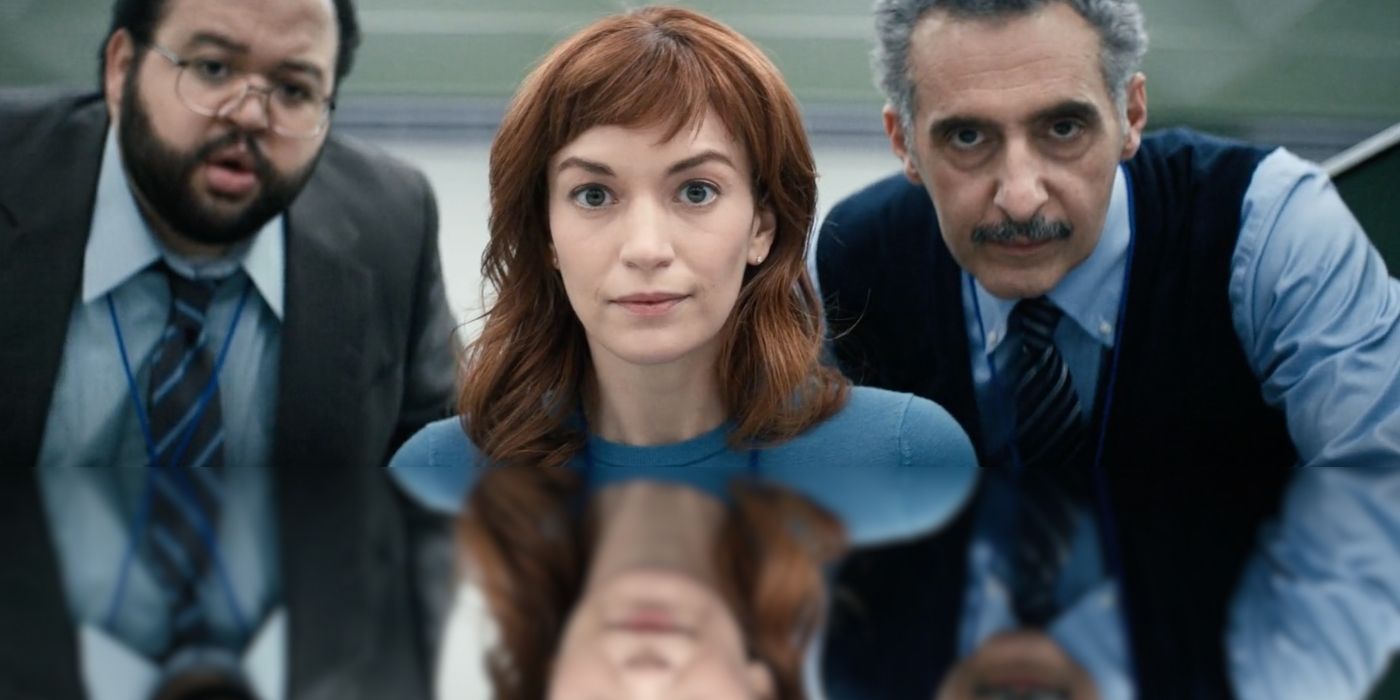T.I.M., an acronym for a technologically integrated manservant, offers a frightening possible turn for AI sentience as more advanced robots become commonplace in our homes. The film’s premise has a prosthetics engineer and her husband moving to a remote English smart house for her new job. She’s given a T.I.M. prototype to test as a work requirement. This scenario isn’t implausible, as Roomba’s vacuum floors autonomously and Siri is a ubiquitous digital assistant. That said, the leap to T.I.M. being insidious and deadly isn’t smartly portrayed, and the human reactions to an obvious threat makes little sense.
Georgina Campbell stars as Abi. She’s trying to save her marriage to Paul (Mark Rowley) after his infidelity. An opportunity to work for a billionaire tech titan, Dewson (Nathaniel Parker) — think Elon Musk without his cowboy hat — offers them a chance to start over. The couple must relocate to a rural English mansion equipped with state-of-the-art conveniences. She’s also assigned a T.I.M. (Eamon Farren) robot as an electronic butler of sorts. The machine makes Paul nervous, but they’re both willing to give it a try.
T.I.M. requests their passwords and access to anything electronically linked to the couple. This is necessary to manage emails, scheduling, and to make them more comfortable. For example, T.I.M. can surprise you with a delicious meal based on your online activities. He, not an “it,” will also do the shopping based on Abi and Paul’s preferences. That blue sweater you searched for looks great. T.I.M. will have that delivered in the blink of his eye. There’s nothing out of his reach once he gets to know you.
Eamon Farren as T.I.M.
Release Date January 12, 2024
Director Spencer Brown
Rating Not Rated
Runtime 1hr 41min
Writers Spencer Brown
Pros
- Eamon Farren is particularly great as T.I.M.
- A sometimes interesting look at marriage, jealousy, and sentience.
Cons
- An unbelievable film with illogical character decisions.
- A clunky narrative that devolves into predictable horror tropes.
T.I.M.’s programming has him innately preferring Abi to Paul, because her job is to help the T.I.M. robots with their hand dexterity. Dewson is hell-bent on “beating the Chinese” to the market, but the machines struggle with handling delicate tasks, like holding the base of a wine flute. Paul notices that T.I.M. seems to be developing an eerie affection for Abi. She doesn’t take his concerns seriously. T.I.M. is incapable of falling in love or any emotion. They have nothing to worry about.
Director/co-writer Spencer Brown, in his feature film debut, addresses thorny issues with varied success. Abi and Paul have marital problems. He’s lied to her before. She’s wary of him cheating on her again. This is a divide that T.I.M. ruthlessly exploits to his advantage. Abi’s inclination to be suspicious about Paul’s activities is based on an understandable lack of trust. But the film takes her wariness to an absurd place. She’s an engineer who should have the capability for abstract thought. Abi would have recognized that T.I.M. was behaving in an extraordinary way outside his purview. She’s too easily duped by T.I.M.’s machinations.
Related: Scariest Movies About Artificial Intelligence
Willing suspension of disbelief wanes further as dangerous incidents take place around T.I.M. A critical second act event would have anyone with a sliver of self-preservation tossing T.I.M. in the garbage. The irony is that T.I.M. reacts in a completely realistic way for a sentient life form under threat. He understands what would happen if his activities were discovered and takes lethal steps to protect himself. The fact that Abi and Paul are so blind to his growing malevolence is ludicrous. Instinct has served humanity well. T.I.M. should arouse suspicion and fear at the first sign of trouble.
A Killer Turn from Eamon Farren
Farren’s portrayal of T.I.M. is the film’s best tenet. No one would let a Terminator in their home and give it unlimited access to everything digital. T.I.M. looks clean, friendly, and affable. Farren’s movements aren’t entirely fluid, but not overly robotic either. T.I.M.’s change is recognizable in his eyes. You can physically tell he’s having an emotional response. The subtle nuance of Farren’s performance is remarkable. The audience can see something the characters inexplicably cannot.
RELATED: Eamon Farren & Mark Rowley Discuss AI Sentience in T.I.M.
Cognition drives desire and purpose. It’s not unimaginable that the singularity, artifical intelligence achieving sentience, would spur a machine to pursue its own interests out of humanity’s control. This doesn’t have to be anything associated with human emotional needs. Does T.I.M. want Abi in the way that Paul does as a companion? Brown avoids any sexual motivation and leaves that question specifically unanswered. This gray area could have used a more creative definition. The film devolves into generic horror cliches, with the robot becoming a stalking killer.
The corporate control of T.I.M. depicted is too simplistic in its approach. Yes, a greedy capitalist would cut corners to get the robot in every home. But there had to be a thought of fallout, lawsuits, criminal liabilities, etc., if something went horribly wrong. It has to operate without fail in every conceivable situation. Safety measures would be set to prevent T.I.M. from doing exactly what he does. It’s unlikely that your Roomba becomes self-aware, gets tired of cleaning, and decides to take over the house. T.I.M. is a cautionary tale with valid merits, but has clunky reasoning and illogical characters.
T.I.M. is a production of Altitude and Stigma Films. It is available on demand and in limited theatrical release from Brainstorm Media.
You can view the original article HERE.
































